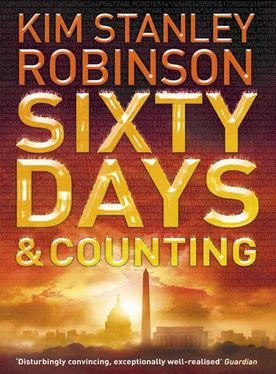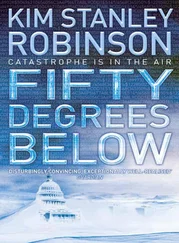But then they would walk home and enter the house, and life with Anna and Nick, and often that was the last they would have to do with each other until bedtime. So – who knew? It was not like the old days, with the vast stretches of the day, the week, the season, extending before and behind them in a perpetual association not unlike the lives of Siamese twins. Charlie now saw only fragmentary evidence. It was hard to be sure of anything.
Nevertheless. He saw what he saw. Joe was not the same. And so, trapped at the back of his mind (but always there) was the fear that he had somehow misunderstood and asked for the wrong thing for his son – and gotten it.
As the winter deepened it became more and more expensive to warm the entire house. The price of heating oil became a political issue, but President Chase tried to keep the focus on the alternative sources they needed to develop. At the Quiblers’, Anna programmed the house’s thermostat to choreograph their evenings, so that they congregated in the kitchen and living room in the early evenings, and then bumped the heat upstairs in the hour before bedtime to augment whatever heat had gathered there from below. It worked fairly well, following and reinforcing what they would have done anyway. But one exceptionally cold night in early February the power went out, and everything was suddenly different.
Anna had a supply of flashlights and candles in a cabinet in the dining room, and quickly she banged her way to them and got some candles lit in every room. She turned on a battery-powered radio, and Nick twiddled the dial trying to find some news. While Charlie was building up the fire in the fireplace, they listened to a crackly distant voice that said a cold front like one from the winter before had dropped temperatures across New York, Pennsylvania, and New Jersey by up to sixty degrees in twenty minutes, presumably causing a surge in demand or a malfunction at some point in the grid, thus crashing the system.
‘I’m glad we all got home in time,’ Anna said. ‘We could have been in the Metro somewhere.’
They could hear sirens beginning to oscillate through the air of the city. The Metro had an emergency generating system, Charlie thought, but no doubt the streets were clotted with cars, as they could see was true out on Wisconsin, just visible from their front window. When Charlie stepped outside to get more firewood from their screened-in porch, he smelled the smell of a power outage, unexpectedly familiar from the winter before: exhaust of burned generator fuel, smoke of green firewood.
Inside the boys were clamoring for marshmallows. Anna had unearthed a bag of them at the back of a kitchen cabinet. Anna passed on trying one, to Joe’s amazement, and went to the kitchen to whip up a late salad, keeping the refrigerator door open for as short a time as possible, wondering as she did so how quickly an unopened refrigerator would lose its chill. She resolved to buy a couple of thermometers to find out. The information might come in useful.
Back in the living room, Charlie had finished lighting all the candles in the house, a profligacy that created a fine glow, especially when they were set around the room where the shadows from the fire congregated the most. Carrying one upstairs, Anna watched the shadows shift and flicker with her steps, and wondered if they would be warm enough up there that night; the bedrooms felt colder than the inside of the refrigerator had. She wondered briefly if a refrigerator would work to keep things from freezing in a sub-zero house.
‘We should maybe sleep on the couches down here,’ she said when she was back in the living room. ‘Do we have enough firewood to keep a fire going all night?’
‘I think so,’ Charlie said. ‘If the wood will burn.’
Last winter after the cold snap, there had been a period when firewood had been deemed cheaper heat than oil or gas, and all the cured firewood had been quickly bought and burned. This year green wood was almost all that was available, and it burned very poorly, as Charlie was now finding out. He threw in a paraffin-and-sawdust log from time to time, and used his massive wrought-iron fire tongs to lift the heavy recalcitrant logs over the fake ones to dry them out and keep things going.
‘Remind me to buy dry wood next time.’
Anna took her bowl back into the kitchen. Water was still running, but it wouldn’t for long. She filled her pots, and a couple of five gallon plastic jugs they had in the basement. These too would freeze eventually, unless she put them near the fire. They needed a better black-out routine, she saw. She took them out to the living room and saw the boys settling in. This must be how it had been, she thought, for generations on end; everyone huddling together at night for warmth. Probably she would have to work from home the next day, though her laptop battery was depleted. She wished laptop batteries lasted longer.
‘Remind me to check the freezer in the morning. I want to see if things have started to thaw.’
‘If you open it, it will lose its cool.’
‘Unless the kitchen is colder than the freezer. I’ve been wondering about that.’
‘Maybe we should just leave the freezer door open then.’
‘Maybe we can get the fire going in it!’
They laughed at this, but Anna still felt uneasy.
They built a city on the coffee table using Joe’s blocks, then read by candlelight. Charlie and Nick hauled an old double mattress that they called the Tigers’ Bed up from the basement, and they laid it right before the fire, where Joe used it as a trampoline which looked like it was going to slingshot him right into the feeble blaze.
When everything was arranged, Charlie read aloud some pages from The Once and Future King , about what it was like to be a goose migrating over the Norwegian Sea – a passage that had Anna and the boys entranced. Finally they put out the candles, and fell asleep –
Only to awaken all together, surprised and disoriented, when the power came back on. It was 2 AM, and beyond the reach of the smoldering gray coals the house was very cold, but fully lit, and buzzing with the sounds of its various machines. Anna and Charlie got up to turn the lights off. The boys were already asleep again by the time they got back downstairs.
The next day, things were back to normal, more or less, though the air was still smoky. Everyone wanted to tell stories about where they had been when the power went off, and what had happened to them.
‘It was actually kind of nice,’ Charlie said the next night at dinner. ‘A little adventure.’
Anna had to agree, though she was still uneasy. ‘It wouldn’t have been if the power were still off.’
Again foul weather shall not change my mind, But in the shade I will believe what in the sun I loved.
—Thoreau
Against the pressure at the front of one’s thoughts must be held the power of cognition, as a shield. Cognition that could see its own weak points, and attempt to work around them.
Examination of the relevant literature, however, revealed that there were cognitive illusions that were as strong or even stronger than optical illusions. This was an instructive analogy, because there were optical illusions in which one’s sight was fooled no matter how fully one understood the illusion and its effect, and tried to compensate for it. Spin a disk with certain black and white patterns on it, and colors appear undeniably to the eye. Stand at the bottom of a cliff and it will appear to be about a thousand feet tall, no matter its real height; mountaineers called this foreshortening, and Frank knew it could not be avoided. From the bottom of El Capitan, one looked up three thousand feet, and it looked like about a thousand. In Klein Scheidegg one looked up the north face of the Eiger, and it looked about a thousand feet tall. You could not alter that even by focusing on the strangely compact details of the face’s upper surface. In Thun, twenty miles away, you could look south across the Thunersee and see that the north face of the Eiger was a stupendous face, six thousand feet tall and looking every inch of it. But if you returned to Klein Scheidegg, so would the foreshortening. You could not make the adjustment.
Читать дальше












